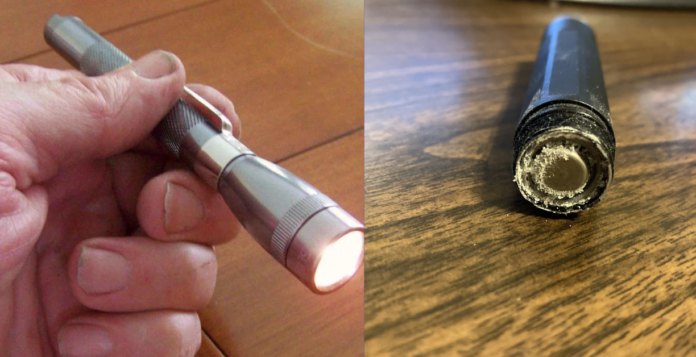how to remove corroded battery from flashlight , Frustrating and sometimes dangerous, dealing with a flashlight’s damaged battery requires careful handling. If you ignore corrosion, it will ruin the flashlight’s functioning and maybe ruin the gadget altogether. Although it may be difficult, try these procedures to remove a corroded battery from a flashlight:
how to remove corroded battery from flashlight
1. *Safety first:* Prioritize safety by avoiding contact with caustic chemicals by using protective glasses and gloves.
2. *Check for damage:* Determine how bad the rust is. You might try cleaning it yourself if it’s not too bad. Think about getting a specialist’s opinion if it’s bad.
3. *Get everything ready:* Collect baking soda, cotton swabs, or a gentle brush, as well as lemon juice or vinegar.
4. Use vinegar or lemon juice to administer the solution: Soak a cotton swab or brush in vinegar or lemon juice, then dab it into the regions that have corroded. Just a few minutes will do the trick for dissolving the rusting.
5. *Apply baking soda to neutralize acid*: Sprinkle baking soda over the corroded areas to remove any residual acid.
6. *Rinse with water:* Remove any remaining vinegar, lemon juice, or baking soda using a moist cloth or paper towel.
7. *Remove the battery:* After you’ve removed the corrosion, use non-conductive equipment, such as plastic tweezers or a popsicle stick, to carefully pull the battery out. Avert electrical shorts by refraining from utilizing metal implements.
8. *Properly Dispose of the Battery:* After the battery has corroded, put it in a plastic bag and remove it in accordance with your city’s hazardous waste standards.
To minimize additional harm to the flashlight, consider obtaining expert help if the battery is still stuck or if there is substantial damage.
Here we’ll show you how to remove corroded battery from flashlight and give you some pointers on how to keep your batteries from being corroded again.

Read more
how many watches should a man own
how much is a vuse battery at a gas station
how long do cigars last in plastic wrapper
First Things First: Evaluate the Property
Find out how bad the corrosion is before you try to take the damaged battery out. Cleaning up minor rust may be all that’s needed, but if the corrosion is too bad, you may want to call in the pros. Keep an eye out for rust or a white powdery residue around the battery compartment; these might be indicators of corrosion.
If the battery in my flashlight is corroded, how can I detect it?
Answer: Be on the lookout for rust on the battery contacts or a powdery material that is white or greenish in color around the terminals of the battery. A drop in performance or trouble turning on the flashlight might possibly be on the horizon.
Step 2: Collect Ingredients
Get everything you need to remove the corroded battery safely:
– Safety goggles and gloves – Citric acid or vinegar
– Baking soda – Cotton swabs or a delicate brush
– Hydration
– Instruments that do not carry electricity (such as a popsicle stick or plastic tweezers)
To what end is protective gear necessary?
Answer: The battery contains corrosive compounds that may irritate the skin and perhaps cause eye injury. One way to avoid direct contact is to use protective glasses and gloves.
Third, squeeze some lemon juice or vinegar over it.
To remove corrosion from the battery compartment, soak a cotton swab or brush in vinegar or lemon juice and then apply the solution to the affected regions. By dissolving the corrosion, these acidic compounds facilitate battery removal.

What additional acidic compounds are available?
A: To answer your question, yes, additional acidic chemicals such as citric acid or cola may also effectively remove corrosion. On the other hand, you may safely utilize the easily accessible vinegar and lemon juice.
Fourth, use baking soda to balance the pH.
Sprinkle baking soda over the corroded areas after letting the vinegar or lemon juice settle for a few minutes. Baking soda is useful for removing corrosion since it neutralizes any acid that may be present.
Is it necessary to use baking soda?
A: Baking soda isn’t strictly required, but it does help neutralize any acid residue and prevent more rusting.
Step 5: Use Water for Cleaning
After you’ve cleaned the battery compartment with baking soda, vinegar, and lemon juice, wipe it off with a moist paper towel or cloth. Be careful to dry and clean the compartment completely before moving on.
Is it okay to clean the compartment with soap and water?
A: Soap leaves residue that might interact with the battery, thus it’s better to avoid using it. To clean, just use plain water; however, before replacing the battery, make sure the compartment is totally dry.
Remove the battery (Step 6).
Carefully remove the corroded battery from the flashlight using non-conductive utensils like a popsicle stick or plastic tweezers. To keep the flashlight in working order and avoid electrical shorts, stay away from metal objects.
What should I do if the battery remains stuck?
If the battery is still stuck after that, don’t use too much effort as the flashlight might break. To remove the battery safely, you might consider getting a professional.
As a seventh step, properly dispose of the battery.
After removing the corroded battery, put it in a plastic bag and dispose of it in accordance with your local hazardous waste standards. Never throw out a dead battery in the ordinary garbage.
Be patient and take all necessary safety measures while dealing with a flashlight’s corroded battery. You may safely remove the battery and get your flashlight working again if you follow these procedures and take the necessary precautions. Remember to always handle corroded batteries with care and dispose of them responsibly to protect yourself and the environment.














